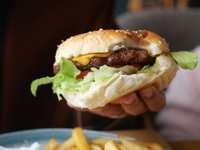Why You Shouldn't Embrace Every Food Trend on Social Media

It’s hard to resist an influencer sharing their seemingly effective workout routines or a doctor offering diet advice to lose weight.
“It’s human nature to look for a quick fix,” says Brenna Gabaldon, PA-C, RD, physician assistant in bariatric and metabolic surgery to Dr. John Primomo, MD, and Dr. Tanyaradzwa Kajese, MD, in affiliation with Memorial Hermann NewStart Surgical and Medical Weight Loss®. “We all want something fast and easy that’ll solve our problems.”
Whether it’s living on celery juice, quitting carbs or fasting intermittently, these miracle “cures” can be more harmful than healthy. And when you return to your old ways, weight returns—and may bring extra baggage—and health risks—with it.
“These diets don’t last because they’re not resolving any unhealthy relationship you might have with food,” Gabaldon says. In fact, if anything, they spur dysfunctional eating. “Plus, the diets are too drastic to be sustainable throughout your life.”
Below are some words of advice when you are considering hopping on the trend bandwagon:
Early Success is a False Indicator.
Initially you might lose water weight, but it will likely return.
“With celery juice, the theory is it’s high in water, so it keeps you full, has some vitamins and minerals and is very low-calorie,” Gabaldon says. “But you’re malnourished without protein, fat and carbs that are essential to your daily biologic function.”
Don't Trust Social Media Motives.
“Most people just want to be heard, so they may take drastic measures to get followers and likes,” she says. “Instagram and TikTok are not the best places to get accurate nutritional information.”
High social media engagement numbers can earn lucrative ad contracts, sometimes making their content disingenuous. “Unless a physician or medical provider is trained in obesity management or has a background in nutrition,” she says, “I’d take their recommendations with a grain of salt.”
Start Off Right.
Your health care provider can order lab tests—and refer you to a registered dietitian or provider trained in nutrition, such as a nurse practitioner, physician or physician assistant.
“Also, health insurance often covers at least a couple of in-person or virtual visits with a registered dietitian, who is a far more reliable resource than the internet,” she says. “They can dispel myths and lead you down a science-backed path to sustained success.”
Put on the Brakes.
Taking things slowly is the key to success. Only one or two small changes at a time may slow your progress, but also make it easier to carry on for a lifetime.
You Should Feel Better, Not Worse.
Your body may protest or reject the effects of a poor diet. You may feel fatigued or have headaches, brain fog and gastrointestinal distress due to lack of essential minerals, vitamins and nutrients.
High-fat diets are hard on your heart and blood vessels, and all-carb diets could be disadvantageous to diabetics, because they could play havoc with blood sugar. Excessively low levels of potassium can disrupt your heart rhythm, while too few vegetables and fruit can lead to neurological deficiencies such as weakness and dementia. You also can cause irreversible damage to your bone density.
Diets that aim to get you into ketoacidosis state can cause inflammation in your blood and acidity in your urine, in turn hurting your kidneys.
Such imbalanced fare may waste time and money, but more importantly, could harm your health, Gabaldon says. Any extreme weight loss should be supervised by a weight management specialist—ideally, hospital-affiliated.
Rollercoaster Diets Backfire.
The highs and lows of following fads and falling back into old ways can worsen your insulin sensitivity, leading to increased risk of diabetes. “If you’re eating only 600 calories, your body clings to the pounds because it needs enough calories for your body to breathe and pump blood,” Gabaldon says. “Such restrictive diets should only be done for a limited time in a clinical setting.”
If Fads Worked, Celebs Would Stick to Them.
Many celebrities tout the success of a strict keto diet and have publicly lauded consuming celery juice when it was trendy. But most of these celebrities are also very calorie-conscious and some exercise hours a day and spend ample time in the gym. Many have personal trainers and chefs at the ready to prepare healthy homemade meals.
Use Logic.
If it sounds too good to be true, it probably is. Your body requires a well-balanced diet, rich in fruits, vegetables, legumes, whole grains, fish and low-fat dairy or meat. And you still need carbohydrates, protein and fat. “If you find a diet that says ‘run away from bananas,’ you should run away from that diet,” Gabaldon says.
“Eat as many vegetables and fruits as you want because they’re so good for you. You don’t have to count those calories,” Gabaldon says. “Then add fish that’s lean and healthy, and complex carbs like brown rice, and you’ve got yourself a meal, which is so much more enjoyable than just eating cabbage.”
Pay Attention.
“Practice mindful eating, where you stop at the first sign of feeling full, chew thoroughly and think about why you’re craving cake,” she says. “Maybe you’re thirsty or sad.”
Exercise also helps, but within reason. The American Heart Association recommends 30 minutes of movement for five days a week. “But if you’re living on queso and pork rinds or following another unhealthy fad, you cannot work out enough to cancel a poor diet,” says Gabaldon.

















